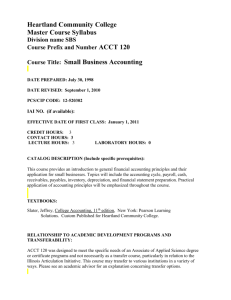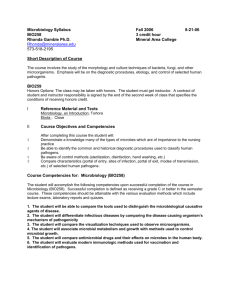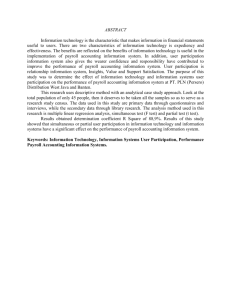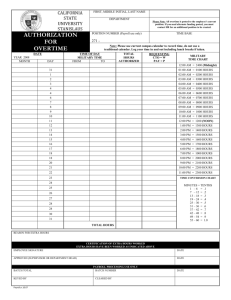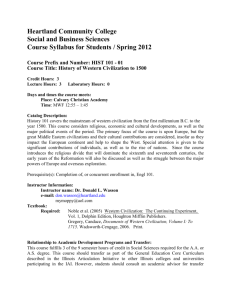ACCT 120 01 PILCHARD Fall 11
advertisement
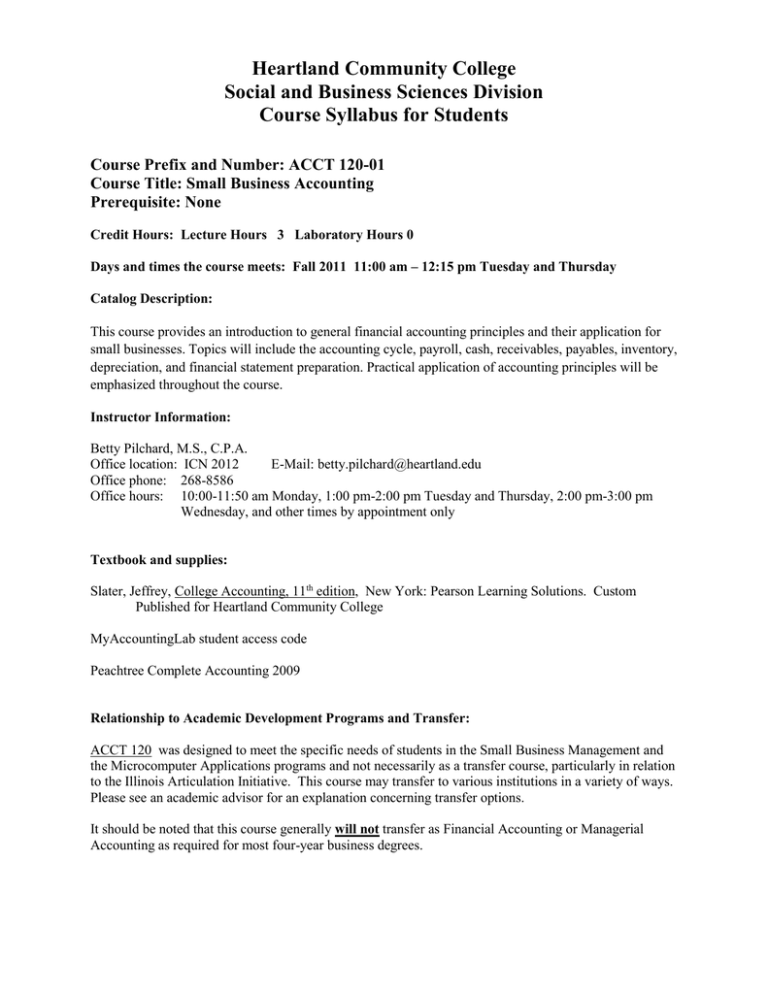
Heartland Community College Social and Business Sciences Division Course Syllabus for Students Course Prefix and Number: ACCT 120-01 Course Title: Small Business Accounting Prerequisite: None Credit Hours: Lecture Hours 3 Laboratory Hours 0 Days and times the course meets: Fall 2011 11:00 am – 12:15 pm Tuesday and Thursday Catalog Description: This course provides an introduction to general financial accounting principles and their application for small businesses. Topics will include the accounting cycle, payroll, cash, receivables, payables, inventory, depreciation, and financial statement preparation. Practical application of accounting principles will be emphasized throughout the course. Instructor Information: Betty Pilchard, M.S., C.P.A. Office location: ICN 2012 E-Mail: betty.pilchard@heartland.edu Office phone: 268-8586 Office hours: 10:00-11:50 am Monday, 1:00 pm-2:00 pm Tuesday and Thursday, 2:00 pm-3:00 pm Wednesday, and other times by appointment only Textbook and supplies: Slater, Jeffrey, College Accounting, 11th edition, New York: Pearson Learning Solutions. Custom Published for Heartland Community College MyAccountingLab student access code Peachtree Complete Accounting 2009 Relationship to Academic Development Programs and Transfer: ACCT 120 was designed to meet the specific needs of students in the Small Business Management and the Microcomputer Applications programs and not necessarily as a transfer course, particularly in relation to the Illinois Articulation Initiative. This course may transfer to various institutions in a variety of ways. Please see an academic advisor for an explanation concerning transfer options. It should be noted that this course generally will not transfer as Financial Accounting or Managerial Accounting as required for most four-year business degrees. 2 LEARNING OUTCOMES: Course Outcomes General Education Outcomes 1. Describe the role of accounting as an information development and communication system that provides information for economic decisionmaking. 2. Apply the accrual basis accounting rules to analyze and record transactions throughout the accounting cycle including year-end adjustments for accruals and deferrals and closing entries. 3. Prepare a classified balance sheet, a single-step income statement for a service business, and a multi-step income statement for a merchandising business. 4. Utilize payroll accounting record keeping procedures to compute, record, and report payroll and payroll tax obligations. 5. Analyze and record sales, inventory, and cost of goods sold transactions using the periodic inventory method. 6. Identify and analyze the components of an internal control system and the internal control activities necessary to safeguard assets and assure the accuracy and reliability of accounting records. 7. Analyze and record transactions related to vendors and customers utilizing a subsidiary ledger system. 8. Analyze and record transactions related to the acquisition, depreciation, and disposal of plant assets. 9. Analyze and record owner equity transactions for sole proprietorship or a partnership. 10. Utilize accounting general ledger software to record basic accounting transactions. Throughout the semester, students will achieve the following Gen Ed outcomes: PS 1 PS 2 CT 1 CT 2 Program Outcomes Accounting Foundations* Throughout the semester, students will achieve the following Accounting Foundations program outcomes: AF 1 AF 2 AF 3 AF 4 Range of Assessment Methods Throughout the semester, the following assessment methods will be used to measure the course, program, and Gen Ed learning outcomes: Homework, Exams, Quizzes, Cases and other activities as determined by the instructor. 3 * Accounting Foundations Outcomes: AF 1 Use critical thinking skills to complete all steps of the accounting cycle according to generally accepted accounting practices, both manually and using computerized accounting software, and to prepare financial statements for a company. AF 2 Create, manage, and protect the accounting information systems, accounting records, payroll records, and customer and vendor information in accordance with appropriate laws and regulations, ethical standards, and management policies AF 3 Prepare accounting records and documentation necessary to prepare sales, payroll, and income tax returns. AF 4 Understand and practice professional work habits expected in the accounting field, including confidentiality and accounting ethics. COURSE/LAB OUTLINE: 1. 2. 3. 4. 5. 6. 7. 8. 9. Introduction to Accounting and the Accounting Model The Accounting Cycle Accounting for Cash and Internal Control Accounting for Payroll and Related Liabilities Accounting for Merchandising Businesses Accounting for Receivables and Payables Accounting for Plant Assets Accounting for Owners’ Equity for Partnerships Classified Financial Statements STUDENT LEARNING AND SUCCESS Philosophy of Teaching and Learning My philosophy of teaching and learning revolves around the belief that the ultimate responsibility for learning belongs to the student while it is the teacher’s responsibility direct the learning process by providing a classroom environment that encourages the student to reach for their fullest individual potential. As the teacher, I have a responsibility to direct the learning process by providing: a classroom environment that is respectful and supportive of the student while encouraging student success an appropriate mix of course materials and activities to help the student learn the subject matter assistance with understanding the basic theories and principles of accounting/business that correlate to the course materials opportunities for students to assess their learning before they are evaluated for grades an introduction to the basic principles, strategies or decision making tools that will provide the foundation needed for the students’ future studies in accounting and business as well as for their lives/jobs. 4 As the student, you have a responsibility to: be prepared for class be willing to actively participate in all course related activities be respectful of the instructor and the other students in the classroom assess your own learning so you can communicate effectively when you encounter difficulties with course materials. I believe there is definitely a reciprocal relationship between my responsibilities as the teacher and your responsibilities as a student. Over the years I have found that if I live up to my responsibilities as the instructor, you will find your responsibilities much easier, and vice versa. I have also found that if I live up to my responsibilities, you are much more likely to take you responsibilities more seriously and that is when you will begin to see your true individual potential. STUDENT SUCCESS 1. 2. 3. 4. 5. 6. 7. Attend all classes and participate in class discussions! Read and review all assigned material prior to class. Complete all assigned homework problems/exercises prior to class. After the assignments have been discussed in class, review the problems/exercises and complete all aspects of the assignment for future reference. Complete all assigned cases and prepare for all other class activities. Review chapter materials on the website. Take quizzes and exams based on material covered or assigned. Ask questions!!! COURSE POLICIES Grading System: Total points accumulated during the semester will determine course grades. Points will be assigned as follows: Prequizzes (top 11) 44 points In Class Quizzes (top 8) 80 points Online Homework (top 15) 150 points Cases (3) 76 points Hourly exams (2) 200 points Final exam 100 points Total points possible 650 points Grading Scale: The grading scale used to determine the course grade will be: A = 582 to 650 points B = 514 to 581 points C = 446 to 513 points D = 378 to 445 points F = Less than 378 points 5 Policies on Assignments/Tests/Make-ups: All online activities that are graded for course points must be completed by the due dates announced in class or posted on the webpage to receive credit. *** NO ONLINE TIME EXTENSIONS WILL BE GIVEN, NO EXCEPTIONS.*** The Prequiz for each chapter must be completed online before we begin discussion of that chapter’s assignments in class. The pre-quizzes are NOT timed and you are given three chances to complete each quiz. The pre-quizzes are designed to assess your comprehension from reading that chapter. There are 13 prequizzes available and only the top 11 scores will be used in the determination of your course grade. The online homework assignments for each chapter must be completed online. They are NOT timed and you are given multiple chances to complete each assignment. Each assignment will have a weighted value of 10 points and your highest attempt will be used. There will be at least 19 homework assignments and only the top 15 scores will be used in the determination of your final course grade. In class quizzes will be given throughout the course. Most of the quizzes will be announced in the class period prior to the quiz; however, some of the quizzes may be unannounced. There will be at least 10 quizzes given during the semester, only the top 8 quiz grades will be used in the determination of your course grade. ***NO MAKE UP QUIZZES WILL BE GIVEN, NO EXCEPTIONS.*** Three cases (extended practice problems) will be assigned during the semester and must be completed by the due dates announced in class to receive credit. Portions of the cases will be completed utilizing computerized accounting software. Students will be allowed to use calculators during quizzes and examinations. Students are responsible for completing quizzes/exams within the allotted time period in case of calculator failure. Calculators on cell phones or other electronic devices may not be used during quizzes or examinations. Examinations will consist of problems, much like those assigned in each chapter, as well as multiple choice, true-false, and/or essay questions that are included to test your conceptual understanding of the material. ***MAKEUP EXAMS WILL BE GIVEN ONLY IF ARRANGED IN ADVANCE UNLESS SEVERE, EXTENUATING CIRCUMSTANCES CAN BE DOCUMENTED. *** Anyone who removes an exam, in part or in total, from the classroom at anytime will be given a grade of "F" for the course. Reproduction of the contents of the exam by any process will result in your receiving a grade of "F" for the course. Attendance Policy: All students are expected to attend class on a regular basis. Consistent class attendance and participation is critical in the learning process since accounting knowledge tends to be cumulative in nature. Some problems will be completed in small groups; you are expected to attend each class period to participate as part of the class. Class attendance and participation in class activities will be evaluated by the instructor and may be considered as part of determining your final course grade. As required by the state, I will take attendance on a daily basis and you must be in class the entire class period to be considered present that day. 6 Student Conduct: The environment in the classroom is an important part of the learning process. It should be free of unnecessary interruptions. Students should be in the classroom prior to start time and stay in the classroom until the class has ended. Coming in late or leaving early is disruptive to the learning process. Additionally the use of cell phones during class is disruptive behavior. Please put cell phones away during class time. Students should conduct themselves in a professional manner at all times. Notice of Cancelled Class Sessions Cancelled class sessions, for all HCC classes, will be listed under Cancelled Class Meetings announcements at www.myheartland.edu. The list will show you the classes have been cancelled for that day and the upcoming week. Be sure to check the last column, which might contain a message from the instructor. Academic Integrity Academic integrity is a fundamental principle of collegial life at Heartland Community College and is essential to the credibility of the College’s educational programs. Moreover, because grading may be competitive, students who misrepresent their academic work violate the right of their fellow students. The College, therefore, views any act of academic dishonest as a serious offense requiring disciplinary measures, including course failure, suspension, and even expulsion from the College. In addition, an act of academic dishonesty may have unforeseen effects far beyond any officially imposed penalties. Violations of academic integrity include, but are not limited to cheating, aiding or suborning cheating or other acts of academic dishonesty, plagiarism, misrepresentation of data, falsification of academic records or documents and unauthorized access to computerized academic or administrative records or systems. Definitions of these violations may be found in the college catalog. Syllabus Disclaimer The instructor reserves the right to alter the course syllabus as circumstances dictate. Any changes will be announced in class and/or emailed. Any student not attending class is responsible for obtaining this information. STUDENT SUPPORT SERVICES Services in Testing Center (Student Commons Building 2001) Testing Services Testing Services provides a secure testing environment for students who are enrolled in online, hybrid, and other distance learning courses; have a documented disability; or need to take a make-up exam. Testing accommodations for students having documented disabilities must be arranged by the student through Disability Support Services, and Testing Services will only administer make-up exams at the request of the instructor. For more information, please call (309) 268-8050. Services in Academic Support Center (1st Floor Student Commons Building) Library The Library provides fast and free access to credible information from a full range of resources including books, online journals, videos, newspapers, online music, class reserves, and interlibrary loan. Individualize research by appointment or come in anytime. See the Library tab in myHeartland, email library@heartland.edu or call (309) 268-8292 for details. 7 Tutoring Services Tutoring Services provides tutoring in various forms at no cost to Heartland students in Normal, Pontiac, and Lincoln. Tutors are available at convenient times throughout the week. Study groups are also available by request. For more information about services available at each location, please call (309) 268-8231 (Normal), (815) 842-6777 (Pontiac), or (217) 735-1731 (Lincoln). Disability Support Services Disability Support Services (DSS) ensures that students with disabilities have equal access to the college’s programs, services and activities through the provision of reasonable accommodations as mandated in Section 504 of the Rehabilitation Act and the Americans with Disabilities Act. DSS offers a wide range of services to support students with disabilities, including: assistive technology, document conversion services, personnel, classroom and testing accommodations. Students with a documented disability who wish to discuss academic accommodations should call (309) 268-8259 for details. Open Computing Lab The Open Computing Lab provides free computing for HCC students at convenient times throughout the week. The computer lab is staffed by trained Lab Assistants and offers the use of approximately 70 computers, a scanner, a laser printer, and an electric typewriter. Services in Community Commons Building (1st Floor Raab Road campus) Academic Advising Academic advisors provide information to students about degree/program requirements, transferability of courses, GPA, and enrollment. Academic Advising may also provide workshops on time management, IRIS navigation, or specific career fields. For more information, please call (309) 268-8033. Career Services Career Services offers guidance and resources to assist students determine their career goals, develop employability and job search skills, and connect with potential employers. In addition, two experiential learning programs, job shadowing and internships, provide students with relevant work-based learning opportunities. Job shadowing assists students in clarifying their career goals. Internships help students “bridge the gap” between the academic environment and employment in their chosen career fields. For more information, please call Career Services at (309) 268-8034. Counseling Services The personal development counselor provides confidential and professional counseling for both emergency and personal issues. Services also include referrals to local community resources. For more information, please call (309) 268-8033. Financial Aid Office The Financial Aid Office provides information on programs and types of financial aid available to students. For more information, please call (309) 268-8020. Transcripts Official and unofficial transcripts may be obtained at the Student Records desk. Transcripts may also be obtained at Heartland’s Lincoln and Pontiac sites. Transcripts must be requested in writing. The form is available online (http://www.heartland.edu/transcripts/index.jsp) or at the Student Records desk. Hours for Support Services Hours that the various support services are available are posted online at www.heartland.edu . Please be advised that hours around holidays and over school breaks may be limited. 8 9 ACCOUNTING 120 – Class Schedule Fall 2011 (TR) Date 8/23 Chpt Online Activities* 8/25 1 C1 Prequiz 8/30 1 C1.1 Homework 9/01 1 C1.2 Homework 9/06 2 C2 Prequiz C2.1 Homework 9/08 2 C2.2 Homework 9/13 3 C3 Prequiz 9/15 3 C3.1 Homework 9/20 4 C4 Prequiz C4.1 Homework 9/22 4 C4.2 Homework 9/27 5 C5 Prequiz C5.1 Homework 9/29 5 C5.2 Homework 10/04 EXAM 1 (Chapters 1-6) 10/06 6 10/11 10/13 10/18 10/20 10/25 Discussion Topic and Class Activities Course Introduction Introduction to Accounting CDE 1, CDE8, E1-3 The Accounting Equation E1-4, E1-5 Financial Statements P1A-3, P1A-4 The Debit Credit Model CDE2, E2-4, P2A-2 Recording Business Transactions P2A-3 General Journal Entries E3-2, P3A-2 The Accounting Cycle Peachtree Case 1 Adjusting Entries E4-2, E4-3, Handout Adjusting Entries E4-4, P4A-2, P4A-3 Closing Entries E5-2, E5-3, E5-5 Review of the Accounting Cycle P5A-3 Cash Receipts & Banking Procedures CDE 3 , P6A-1, P6A-2 Petty Cash & Internal Control for Cash 6 C6.1 Homework E6-2, E6-3, E6-4, P6A-3 Computing Payroll and Payroll Taxes 7 C7 Prequiz CDE 2, CDE3, E7-1, E7-3 Completing a Payroll Register 7 C7.1 Homework P7A-2, P7A-4 Payroll Case Starts Accounting for Payroll 8 C8 Prequiz E8-2, E8-3, E8-4 Reporting Payroll Taxes 8 C8.1 Homework P8A-1, P8A-4, P8A-5 * Online activities due by 8:00 am unless otherwise specified C6 Prequiz 10 Date Chpt Online Activities* 10/27 8 C8.2 Homework 11/01 16 C16 Prequiz C16.1 Homework 11/03 16 C16.2 Homework Discussion Topic and Class Activities Reporting Payroll Taxes in Illinois In Class Activities Accounting for Purchase and Depreciation of Plant Assets CDE1, P16A-2, CDE6, P16A-1 Payroll Case Due Accounting for the Disposal of Plant Assets P16A-3, E16-4, E16-6, P16A-4 11/08 Exam II – Chapters 6-8 & 16 Sales & Accounts Receivable E9-4, E9-5 Cash Receipts and Purchases P9A-2, P9A-3, P10A-1 Purchases and Accounts Payable P10-A2, E10-3 Inventory Accounting E10-8, E10-9, P10A-5 Adjusting entries and Cost of Goods Sold E11-2, P11A-4, P11A-4 11/10 9 C9 Prequiz 11/15 9 C9.1 Homework 11/17 10 C10 Prequiz 11/20 10 C10.1 Homework 11/22 11 C11 Prequiz 11/24 11/29 11 THANKSGIVING C11.1 Homework Peachtree Case 2 Classified Financial Statements C12 Prequiz C12.1 Homework E12-1, P12A-2, P12A-3 Accounting for Partnership Equity C17 Prequiz P17A-1, P17A-2, P17A-3 Accounting for Partnership Equity C17.1 Homework CDE 9, P17A-4 12/01 12 12/06 17 12/08 17 12/15 Final Exam (Chapters 9-12, 17) 10:00 -- 11:50 am * Online activities due by 8:00 am unless otherwise specified The instructor reserves the right to alter the course syllabus as circumstances dictate. Any changes will be announced in class and/or emailed. Any student not attending class is responsible for obtaining this information.

